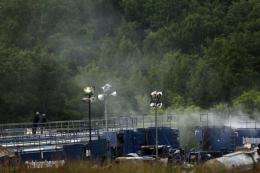Author of US fracking study had gas industry ties: watchdog

A university study that claimed fracking for gas deep beneath the Earth's surface did not cause water contamination was led by a US professor with financial ties to the gas industry, a watchdog group said Friday.
Lead author Charles "Chip" Groat, of the University of Texas, told reporters when the research on hydraulic fracturing was presented at a major science conference in Canada in February that the university had turned down all industry funds for the study.
However, an investigation by the Public Accountability Initiative (PAI) found that Groat himself has been on the board of the Houston-based Plains Exploration and Production Company for several years.
Groat was paid more than $400,000 in cash and stock by the company in 2011, and holds a near $1.6 million stake in the company's stock, it said.
Kevin Connor, the director of the nonprofit PAI, told AFP the report was presented as if it were an independent study on fracking, when it actually represented a "conflict of interest" that should have been disclosed.
A University of Texas spokeswoman told AFP that an investigation has been launched and an independent panel was being convened to review the study, with its findings expected in a few weeks.
She also sent AFP a statement by Steven Leslie, provost and executive vice president of the University of Texas at Austin, which said:
"The most important asset we have as an institution is the public's trust. If that is in question, then that is something we need to address.
"We believe that the research meets our standards, but it is important to let an outside group of experts take an independent look," it added.

"Dr. Groat has been reminded of his obligations to report all outside employment per university policy. If the university had known about Dr. Groat's board involvement, the Energy Institute would have included that information in the report."
AFP was among numerous media outlets which covered the 400-page review of fracking operations in Texas, Louisiana, and Marcellus Shale area throughout the northeastern United States -- and Groat's assertion that the university had turned down all industry funds.
Nor did Groat disclose his gas industry ties to the peer-reviewers, the university, or the organizers of the American Association for the Advancement of Science, which hosted the conference in Vancouver where it was released.
Groat did not respond to an AFP request for comment on the watchdog's report.
In February, Groat said the report, called "Fact-based Regulation for Environmental Protection in Shale Gas Development," aimed to "separate fact from fiction" and give policy makers a tool going forward as the US experiences a major natural gas boom.
Hydraulic fracturing, or "fracking," is a process by which high-pressure injections of water, sand and chemicals are used to blast through rock to release oil and gas trapped inside.
The US Energy Information Administration has said natural gas reserves could supply US needs for 110 years.
Groat said the report's central finding was that there was no evidence that fracking caused groundwater contamination, but admitted that any such events that have occurred were linked to problems with gas operations at or near the surface, not deep in the Earth.
Spills at the drill site or problems with cement casing around upper well bores were examples of incidents that have led to shallow groundwater contamination in the United States, said the study.
"Most of what we have seen happening related to shale gas development that impacts the environment was at or near the surface," said Groat when presenting the findings at the AAAS conference in Vancouver.
"We found no direct evidence that hydraulic fracturing itself -- the practice of fracturing the rocks -- had contaminated shallow groundwater," he added at the time.
"However that doesn't mean that there aren't other parts of the process of gas development that could get things you don't want in shallow groundwater."
Asked by reporters in Vancouver about the integrity of the study and whether there was any industry involvement, Groat said the review was funded by the university and that the team had turned down industry funds.
Connor commended the university for undertaking a review but added: "I find it quite troubling that it is not taking any steps to enforce its conflict of interest policy. A reminder call is not a sufficient enforcement mechanism."
(c) 2012 AFP
















